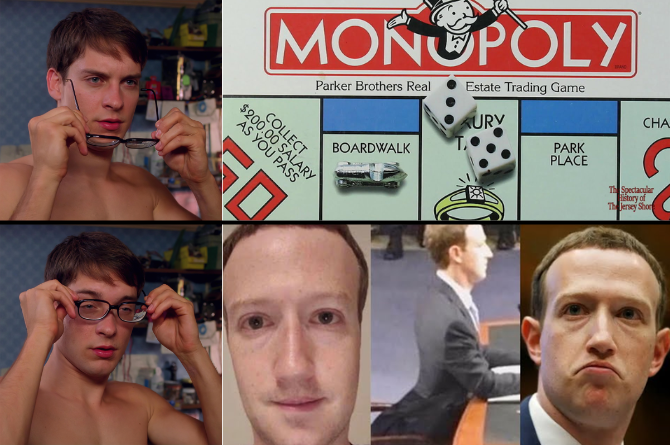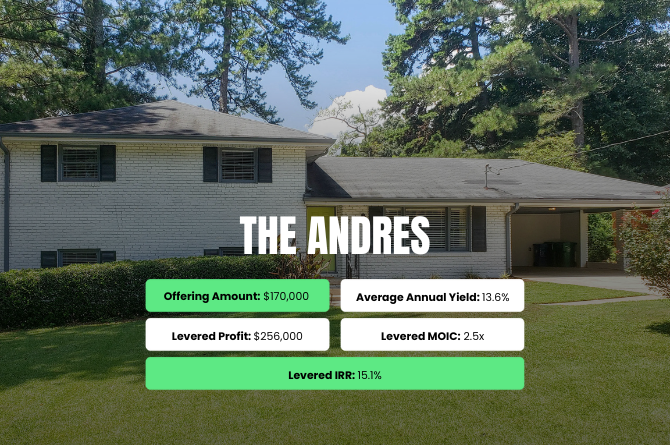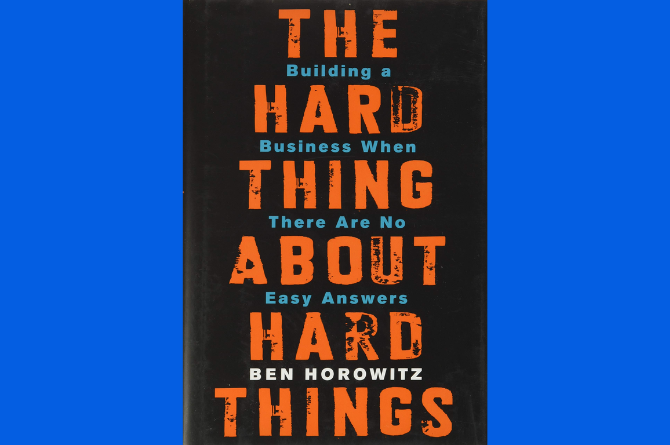April 20, 2025

I've been waiting a long while to have an excuse to bring out the Jet Ski guy from the Tiger King. Yes, it feels a little bit forced, but as I drink from a mug with the phrase "2020 MOOD" on it and a caricature of the jet ski guy, you will understand how rent free in my mind this guy lives.
- Alex Blackwood

🌊 Like the Jet Ski guy in Tiger King - If people don’t understand that reference, check out the image above. Despite economic concerns throughout other industries, Netflix is riding into the sunset. The streaming giant beat revenue estimates in Q1 with revenue growing by 13%. This quarter was the first one Netflix did not disclose streaming subscriber numbers as they changed their north star metric to revenue. They plan on doubling their revenue and tripling their operating profit in the next 5 years to join the pantheon of companies worth $1 trillion.
🖖 Did we just become best friends? Nope - President Trump turned his trigger fingers to Truth Social fingers as he posted on the app on Thursday that “Powell’s termination cannot come fast enough.” The Powell in question is none other than Fed Chair Jerome Powell (“J-Pow” for close acquaintances). Trump has been extremely vocal about his desire to cut interest rates, and he has been calling on the man capable of doing so, to do so. However, J-Pow was on his way to a soft landing, inflation was trending downwards and growth upwards. When Trump began his tariff talks and threatened stagflation, the soft landing has turned into a turbulent one. J-Pow’s term is up in 2026.
😎 Vibing out - OpenAI is entering into vibe coding. The company behind ChatGPT is in talks to buy Windsurf, an AI powered coding product. A term made popular this past year and coined by OpenAI co-founder Andrej Karpathy, “vibe coding” refers to the process of directing AI to write code. OpenAI is looking to spend $3 billion on Windsurf. Those familiar with “vibe coding” are quick to ask why they don’t buy one of the most dominant in the space, Cursor, which OpenAI has already invested into. Well, OpenAI considered that, but Anysphere, the company behind Cursor, broke talks, and is instead in talks to raise at a $10 billion valuation.

The boys were back in town court. This week, the courtroom drama was all about Meta and Google—two companies that, depending on who you ask, either connect the world or own it outright.
What happened?
Let’s start with Meta (née Facebook). The Federal Trade Commission (FTC) has dragged Mark Zuckerberg and his crew to court, arguing that Meta illegally cemented its dominance in social media by gobbling up Instagram and WhatsApp. The government’s case? Meta played a “buy or bury” game—either acquiring up-and-coming competitors or squashing them before they became a threat. The FTC wants Meta to spin off Instagram and WhatsApp, which would be the corporate equivalent of asking someone to split up their fantasy football team mid-season.
Meanwhile, Google was handed a stinging legal defeat. A federal judge ruled that Google illegally dominates two key markets in online ad technology—publisher ad servers and ad exchanges. These tools are basically the plumbing of internet advertising, and the judge said Google’s control not only hurt competitors, but also publishers and, ultimately, all of us scrolling for Chicken Jockey videos (callback to last week’s newsletter!) and SNL clips.
What does this mean?
For Meta, the trial is a high-stakes battle. If the FTC wins, Meta could be forced to break up its empire, sending Instagram and WhatsApp off to fend for themselves. That would be a seismic shift in the social media landscape, and a huge blow to Meta’s business model, which relies on keeping users (and their data) under one big roof.
For Google, the judge’s ruling opens the door for the government to potentially force Google to sell off parts of its ad tech business. While this might not fundamentally change how you use Google Search or YouTube, it could shake up the multi-billion-dollar digital ad market and force Google to rethink where it invests its mountains of ad money.
What were some funny moments from the Meta trial?
Anytime Zuck is on stand, you bet memes are coming from it. Meta’s lawyers came out swinging—with animated graphics, colorful asides, and a sense of humor that’s rare in antitrust court. At one point, Meta’s attorney, Mark Hansen, quipped to the judge, “If you don’t like an ad, you look at the screen, your honor, you just scroll past it.” He later joked about quizzing the judge on the difference between Instagram Reels and TikTok, and even showed a slide of a boxing ring with app logos duking it out.
Mark Zuckerberg, meanwhile, spent more than 10 hours on the stand. The FTC’s lawyer grilled him about a 2012 message where Zuckerberg admitted, “Instagram was growing so much faster than us that we had to buy them for $1 billion… That’s not exactly killing it.” Meta’s defense? “Only the paranoid survive,” Hansen said.
Why should I care?
If you use social media, read news online, or ever wonder why you see so many ads for things you Googled once in 2017, these cases matter. They could reshape how tech giants operate, what apps you use, and how your data is handled. For investors, a forced breakup could mean volatility (and opportunity) in tech stocks. For everyone else, it’s a rare peek behind the curtain at how the digital sausage gets made.
Bottom line:
The government is taking its shot at Big Tech’s biggest players. Whether this is the start of a breakup ballad or just a stern talking-to, stay tuned—because the next chapter could change the way the internet works for all of us.


The Andres is poised for a sellout just four days after its launch, with less than 14% of its offering amount remaining.
This fully operational PadSplit comes with over 15 months of verified financial performance, achieving an impressive NOI yield exceeding 10%.
The Andres has delivered annual post-fee payouts surpassing $60,000 based on its latest trailing twelve months of collections, with Year 1 underwriting conservatively projecting rents at $50,000 pre-fees.
Located in Decatur (like the record setting Mafee), along a major transit corridor offering direct access to downtown Atlanta, The Andres is a turnkey investment with 8 bedrooms, 2 bathrooms, and a 2-car carport. The property was secured fully occupied with advantageous seller-paid credits of $5,000 and all furnishings included, offering immediate operational efficiency.
Investors in The Andres can anticipate strong financial performance, with a compelling Year 1 yield (pre-growth) of 10.2%, an average yield over the hold period of 13.6%, and an annual levered IRR of 15.1%. Projected levered profits reach $256,000, resulting in a substantial levered MOIC of 2.5x, highlighting this PadSplit's exceptional investment potential.
With our recent PadSplit tracking as high as 20.6% annualized yields, The Andres is one opportunity you don't want to miss out on.

Bill Ackman is back in the rental car game, and this time he’s betting Hertz can outrun its past mistakes—and maybe even tariffs. Pershing Square now owns nearly 20% of Hertz, hoping the company’s massive fleet will benefit from Trump’s new 25% tariff on imported cars. Ackman’s math: if used car prices jump 10%, Hertz could see a $1.2 billion boost—half its current market cap. The stock more than doubled this week, giving Hertz employees a reason to smile in their Friday emails. Ackman’s warning: “Investing is risky… Caveat emptor.” Somewhere, Carl Icahn is probably rolling his eyes. The big banks put on a show in Q1, with all six major U.S. banks beating profit forecasts. Morgan Stanley’s equity trading revenues soared 45%, JPMorgan set a new record, and even Wells Fargo managed to beat on earnings (despite a revenue dip). Still, CEOs like Jamie Dimon and Charlie Scharf are keeping the party hats in the closet—citing economic “turbulence,” sticky inflation, and the usual “prepare for anything” Wall Street mood. In other words: profits are up, but so is the anxiety. The credit card world is getting a shakeup. Capital One’s $35 billion all-stock merger with Discover just cleared a major regulatory hurdle, setting the stage for a new payments powerhouse. The deal could mean better acceptance rates for Discover users, but possibly higher interest rates too. Regulators are making Capital One address Discover’s past missteps (including a $100 million penalty for overcharging merchants). If you thought your wallet was crowded before, just wait.

Ben Horowitz’s The Hard Thing About Hard Things promises a no-nonsense look at the brutal realities of running a startup—and it delivers, just maybe not with the flair you’d hope for. The book is packed with practical advice and war stories from Horowitz’s time as a CEO, but it often feels more like a tough-guy memoir than an inspiring playbook. I appreciate the rap lyrics at the beginning of each chapter, as you can see I love deep quotes. If you’re deep into startup culture or leadership, there are nuggets of wisdom here, but for the casual reader, it can be a heavy slog.
⭐ 4.42 / 5.0 in my book (no pun intended)


There’s a basketball court atop the US Supreme Court nicknamed the Highest Court in the Land.

Written by Alex Blackwood & Thomas Horcel
Receive this weekly recap when you sign up for our platform